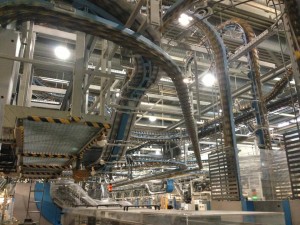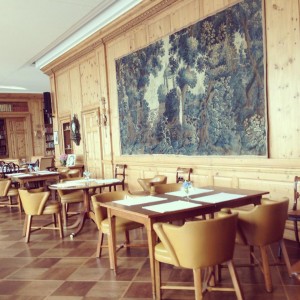DAY 11 – Ketchum Pleon and Süddeutsche Zeitung
It has been very impressive this trip that all of our hosts have been of high rank in their companies and are very knowledgeable in every aspect. We have been very lucky to hear these people talk, and I’m sure many other students would love to have such an honor. That’s why I want to thank Helen and Jan and everyone who put this all together!
As I mentioned before, BMW was a great segway into the next marketing visit. I thought the Ketchum environment was especially inviting. It kind of reminded me of the Smith Brothers in Pittsburgh. The offices were modern and colorful. It would be great to work in such a positive, creative environment.
I thought the highlight of this visit was the case study they showed us for a drug that helped with gas. It put everything that they were explaining about their company and strategies into action. I thought it was genius to work with the stigma that gas has but then relate it to the fact that everyone gets it, even celebrities. The video was also attractive and cute! I could see myself possibly going to grad school for advertising if journalism doesn’t work out for me.
Later in the day we visited Süddeutsche Zeitung was not expecting it to be the leading newspaper in Germany after we received such a confident presentation from Die Welt. The presenters seemed much more humble although not as relaxed. I took a few pictures of the slides they showed that featured charts of the few leading newspapers in the country and their circulation throughout the years. I remember researching the FAZ and its history and these charts not only matched my research, but also tied everything together. I thought it was also very interesting to hear their perspective on the FAZ, which is the most personal and accurate kind of information about a company one can get.
I also took a photo of the slides showing how people get their news, such as people get the Süddeutsche Zeitung mostly through subscription, but Die Welt readers focus a lot more on the internet. They also had a slide that basically painted a picture of the audience of the newspaper. It seemed to be that elite, educated people between the ages of 20-49, who already have an understanding and awareness of issues in the world, are the ones that pick up the paper.
Learning about the online version was also a treat, but I also felt like in the future it might benefit them to focus more on breaking the news online and then publishing it in the paper more often. I know the editor said there is some communication between online and print, but in my mind, they both need to be one in order to survive.
The communications director told us that the paper survives because it provides quality content. It is a family paper, not a full business paper like the FAZ. People pick it up for its credibility and variety. And maybe too for its innovative advertising! I thought it was great that the paper took risks with advertising, especially with BMW. I personally think risk takers set standards.
Seeing its huge presses running was also a great experience. I really enjoyed learning about the long process that happens in order to get the papers out. I thought it was interesting to know that Die Welt is also printed there. The highlight of the tour was hearing about how 9/11 affecting the presses all the way over in Germany as well as the advertising.
Overall, this was a great, informative day. I think it is so great that all of these people take the time to speak with us. I could never imagine an editor from the New York Times speaking to us. I think because we are foreign, it is like an honor to them to speak to us. Whatever the case, I am forever grateful for the experiences!

